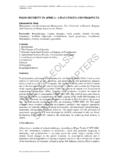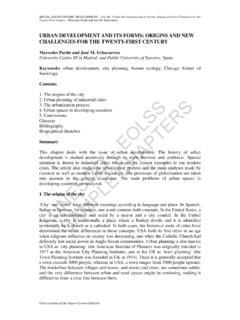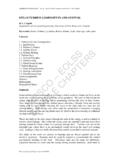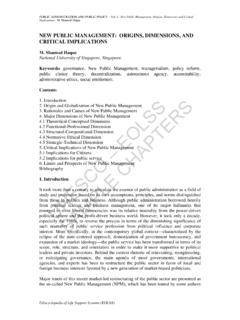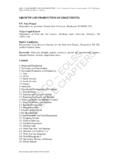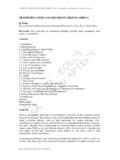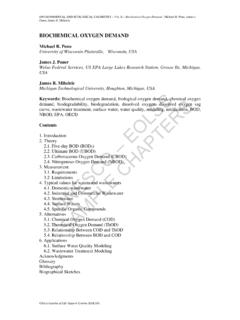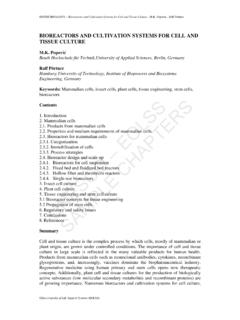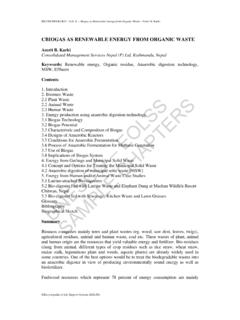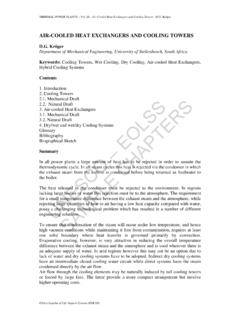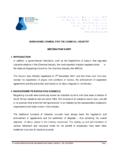Transcription of Political Issues in Human Resource Development
1 Human RESOURCES AND THEIR Development Vol. I Political Issues in Human Resource Development - Tim Hatcher Political Issues IN Human Resource Development . Tim Hatcher Department of Leadership and Human Resource Education, University of Louisville, Louisville, Kentucky, USA. Keywords: anarchy, bounded rationality, bureaucracy, child labor, comparative politics, corporate conscience, corporate libertarianism, corporate social responsibility, culture, deep ecology, democracy, dysfunctional organizational behavior, ecocentric Human Resource Development , e-commerce, ethics, Gaia hypothesis, globalization, Human potential, Human Resource Development , Human rights, information, knowledge, Gaia hypothesis, interdisciplinary, international organizations, lobbying, logical positivism, mass-consumer culture, monoculture, monopoly, neoclassical economics, North American Free Trade Agreement (NAFTA), philanthropy, pluralism, Political ideologies, Political systems, polyarchies, population growth, power, practice, S.
2 TE S. rationalization, social institutions, sociopolitical systems, solidarity, stakeholders, R. AP LS. sustainability, systems thinking, theoretical foundations, totalitarianism, training, unionization, web-of-life, work systems, workplace, workplace violence, worldviews C EO. Contents 1. Introduction 2. Conceptual Framework 3. Politics and Power in Organizations E . H. Political Ideologies Political Influence on Organizations and Human Resources: The Power and PL O. Influence of the Nation-State, Governments, and Polity M SC. Comparative International Politics: Issues of Influence and Dominance 4. Organizational Power: Power and Influence of International Organizations Power and Authority inside Organizations 5. Limitations to Organizational Sustainability: Problems and Pathologies for Politics SA NE. and Power in Organizations and Human Resources 6.
3 Shifting to Ecocentric Human Resource Development : A Sustainable Philosophy for Human Resources U. 7. Closing Thoughts Acknowledgements Glossary Bibliography Biographical Sketch Summary The purpose of this article is to explore Political and power-based influences on Human potential. The impact of politics and power in developing Human resources is a product of the changing nature of the global society and workplace and the role of power and politics in this transformation. In addition, the power and influence of international organizations and the power, authority, and autonomy inherent within organizations is examined. An exploration of the limitations that politics and power have on sustainable Encyclopedia of Life Support Systems (EOLSS). Human RESOURCES AND THEIR Development Vol. I Political Issues in Human Resource Development - Tim Hatcher Development of organizations and Human resources followed by a description of the evolution of more ecocentric methods for the Development of sustainable Human and environmental resources provides clues about the complex contexts in which individuals and organizations interact with their Political environments.
4 Such inquiries into the impact of politics are needed to (a) remove constraints to sustainable Development of Human resources, (b) enhance the Development of global systems that support sustainable Human Resource Development and, (c) build socially- and politically-responsive individuals and organizations. Human Resource Development as an organizational function and as a stand-alone profession plays a principle role in enhancing the long-term sustainability of organizations and has the potential to help cultivate organizations and people that positively influence communities, society, and the environment. The role that politics and power play in the Development of environmental and Human resources requires much more discussion and dialogue than is currently happening. S. TE S. R. AP LS. 1. Introduction To build a sustainable life support system, a system in which current needs are satisfied C EO.
5 Without diminishing the chances of future generations, requires enlightened institutions with social, economic, and Political agendas that enhance Human and environmental Development . Yet, even the smallest and most specialized organizations do not operate in isolation. They are impacted by, and wield varying degrees of power upon, State politics and policy. Their internal systems also affect individuals, processes, E . and the organization as a whole while their outcomes alter external organizations, H. communities, societies, and even the ecosystem. Conversely, external power and PL O. politics influence organizations at several levels, namely, individual, organizational, socio-economic, and strategic. M SC. For the first time in history, the great improvement in the Human species' ability to survive has resulted in unprecedented population growth, uncontrolled mass SA NE.
6 Consumption, and technological advances. These changes have impacted modern commerce and much of the modern workplace. Mirroring scientific discoveries and shifts in scientific worldviews, the technological revolution in developing countries, and U. in global governance, the nature of the workplace in the industrialized countries is transforming and forcing changes on individual and organizational participants worldwide. One of the most spectacular Human commitments of the last half of the twentieth century was to economic growth through tremendous increases in productivity and expansion of global trade. This economic globalization of production has redefined the working class and altered organizational structures, work processes and the Development of Human resources on an international scale while affecting global Political and power relationships.
7 With these economic and technical changes come new demands placed on educational systems in the less developed nations as they attempt to train their workers for increases in technology and production. Similarly, new demands have been placed on the educational systems of the developed nations, as automation and e-commerce have replaced the obsolete routinization of work. Moreover, Political Encyclopedia of Life Support Systems (EOLSS). Human RESOURCES AND THEIR Development Vol. I Political Issues in Human Resource Development - Tim Hatcher ideologies, Political agendas, and policy and power Issues both internal and external to organizations acerbate technological, economic, and social influences on the transformation of the workplace. Information technologies have been criticized as a tool of the privileged few. Economic growth carries previously unsuspected side effects such as the devastation of the environment whose cumulative impact may be covert and be more deleterious than the undoubted benefits that growth also brings.
8 Powerful Political and power-based influences on Human potential require recognition and discussion to (a) remove constraints to sustainable Development of Human resources, (b) enhance the Development of global systems that support sustainable Human Resource Development and, (c) build socially and politically-responsive individuals and organizations. The impact of politics and power in developing Human resources is discussed first through addressing the changing nature of the global workplace and the role of power and politics in this transformation, followed by an account of the Political influence on organizations and Human Development within S. TE S. organizations. In addition, the power and influence of international organizations and R. AP LS. the power, authority, and autonomy inherent within organizations are examined.
9 Finally, the limitations that politics and power have on sustainable Development of organizations and Human resources is debated followed by a description of the evolution of more C EO. ecocentric methods for Development of sustainable Human and environmental resources. 2. Conceptual Framework Human Resource Development (HRD), as an internal organizational function, exists E . within literally thousands of public and private organizations worldwide. Organizations H. exist within economic, societal, and Political contexts that involve customs, rules, laws, PL O. governance processes, concepts of legitimacy, and the allocation of socio- Political power. It is these internal and external Political ideologies that positively and negatively M SC. govern the Development of Human resources, and thus workplaces that are socially and ecologically sustainable.
10 SA NE. The conceptual framework of this article is a synthesis of several major premises. First, comparative politics and the determinates of Nation-State performance external to organizations was coupled with the influence of Political -power systems and Human U. Resource Development within or internal to organizations. These two concepts were linked with the third concept, the influence of international organizations on the Nation- State. In other words, external Political systems and the State influence organizations, and conversely, organizations possess internal power systems and, perhaps for the first time in recorded history, global organizations and industry-based power alliances impact upon global sociopolitical and ecological systems. In addition to external and internal politics and power Issues the socio- Political and rational-legal (economic) ideas of organizations and individual worldviews are further synthesized into the conceptual framework, which adds to the understanding of organizational and Political behaviors.
